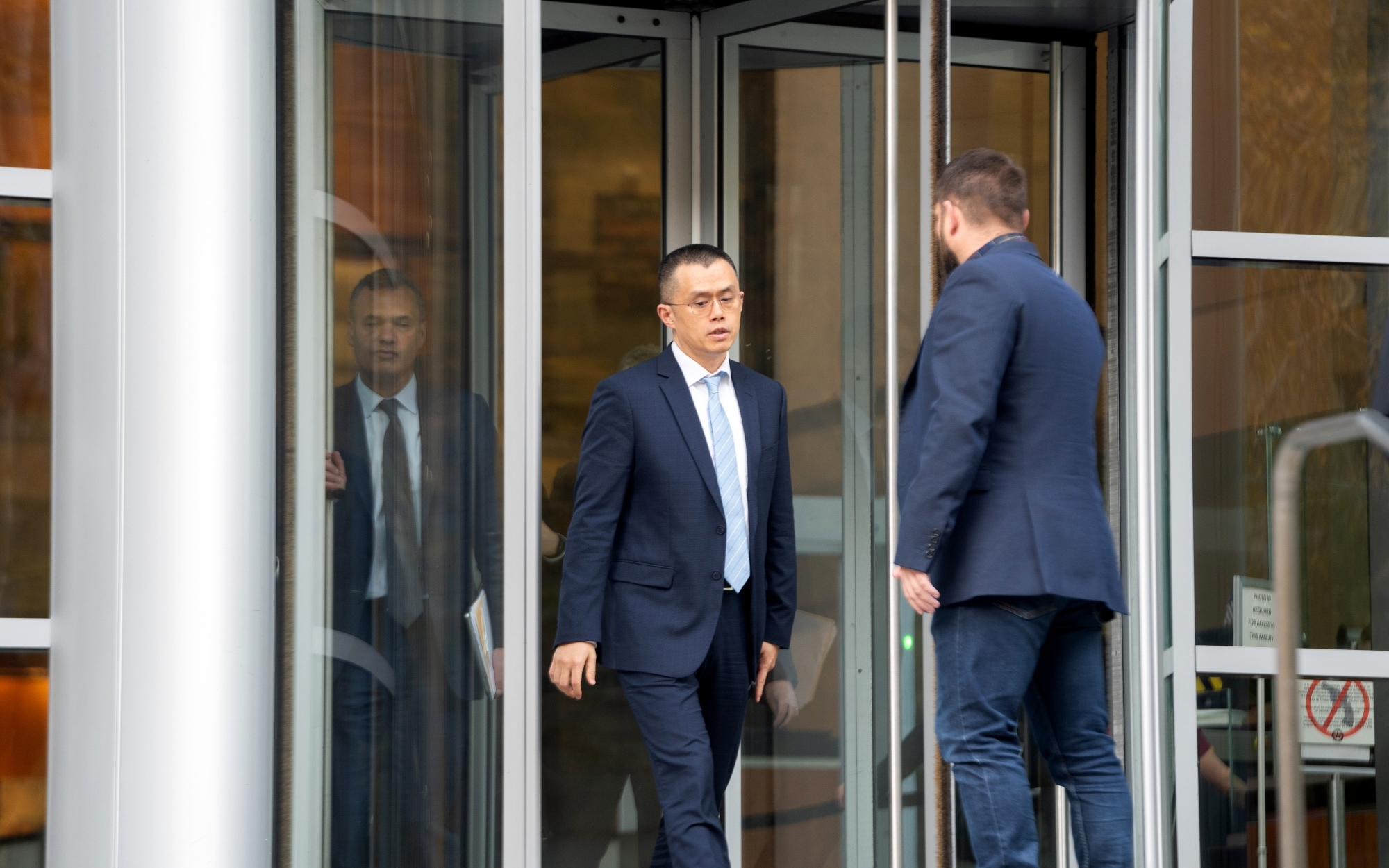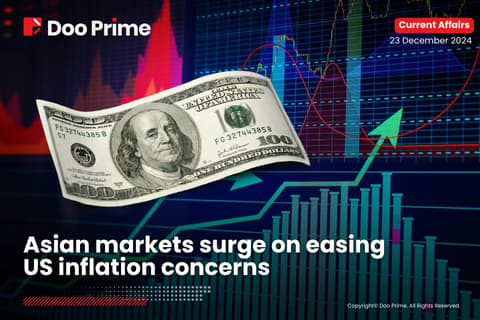Today’s News

Image Source: Arabian Business
Binance’s Founder, Changpeng Zhao, has resigned from his role as CEO and pleaded guilty to breaching U.S. anti-money-laundering laws, agreeing to pay substantial fines amounting to USD 4.3 billion. In a move aimed at preserving the company’s operations, the cryptocurrency exchange admitted wrongdoing and settled civil allegations made by regulators.
Changpeng Zhao acknowledged his missteps in a Seattle federal court, acknowledging Binance’s facilitation of transactions with sanctioned groups and encouraging U.S. users to obscure their locations to evade anti-money-laundering laws. This significant development concludes extensive investigations into Binance’s activities and marks a critical moment in its history since its inception by Zhao in 2017.

Image Source: Bloomberg
“Today, I stepped down as CEO of Binance,” Zhao tweeted. “Admittedly, it was not easy to let go emotionally. But I know it is the right thing to do. I made mistakes, and I must take responsibility.”
Zhao, also known as CZ, is personally liable for a USD 50 million payment and is barred from any involvement with Binance. U.S. sentencing guidelines suggest a potential prison sentence of 10 to 18 months, with prosecutors seeking the maximum 18-month term, as reported by the New York Times.
Despite resigning and pleading guilty, Zhao maintains majority ownership of Binance but is restricted from holding any executive position within the company. This arrangement, struck with the Justice Department, mirrors a previous case involving BitMEX executives. However, the resolution doesn’t cover a settlement with the Securities and Exchange Commission, which separately sued Binance and Zhao for alleged violations of U.S. investor-protection laws.
Binance’s native token, Binance Coin, experienced a 5.3% decline from the previous day’s value, dropping to USD 242, based on CoinDesk data. Meanwhile, Bitcoin, the leading cryptocurrency, also decreased by 1.5% within the same timeframe.
Recent developments have seen key executives leaving Binance, and the exchange had to downsize its workforce this year, grappling with ongoing probes by U.S. authorities.
Criminal Conduct And Legal Negotiations
Prosecutors revealed that Binance had knowledge of its millions of U.S. users since 2018 but failed to establish protocols for identifying money laundering or breaches of sanction laws. Consequently, Binance conducted trades amounting to USD 899 million between American and Iranian users from January 2018 to May 2022, as per prosecutors’ claims.
Attorney General Merrick Garland emphasized that Zhao’s acceptance of these practices goes beyond disruptive innovation and amounts to criminal conduct. “Using new technology to break the law does not make you a disrupter. It makes you a criminal,” he said.
Video Source: Wall Street Journal News
Negotiations between the Justice Department and Binance were protracted, and Zhao engaged new legal representation for this process. However, the settlement announced did not address the lawsuit brought by the Securities and Exchange Commission (SEC), which accused Binance and Zhao of violating U.S. investor-protection laws. Cryptocurrency exchanges like Binance are preparing to contest these claims, asserting that cryptocurrencies do not fall under the SEC’s purview.
CFTC’s Criticisms And Control Uncertainties
The Justice Department’s inquiry examined Binance’s anti-money-laundering measures and its facilitation of trades between individuals in sanctioned nations like Iran and Russia and American users. Additionally, a separate agreement concluded a civil lawsuit by the Commodity Futures Trading Commission (CFTC) against Binance and Zhao earlier this year, with the USD 4.3 billion settlement covering claims from both the CFTC and Treasury Department agencies.
The CFTC alleged that Binance lacked a system to prevent and identify terrorist financing and money laundering over an extended period. It further accused Binance of providing Americans access to derivatives like futures or swaps, which should only be available on regulated platforms within the U.S. Binance’s failure to register with U.S. regulators rendered its high-risk leveraged products inaccessible to American traders, as per the CFTC’s assertions.
Treasury Secretary Janet Yellen emphasized, “Any institution, regardless of its location, that desires to benefit from the U.S. financial system must adhere to regulations aimed at safeguarding us against threats posed by terrorists, foreign adversaries, and criminal activities, or else confront the repercussions.”
Changpeng Zhao, residing in the United Arab Emirates (UAE), became a focal point in negotiations due to the lack of an extradition treaty between the UAE and the U.S. Despite ongoing crackdowns on unregulated crypto by countries like China and the U.S., the UAE has remained hospitable to the industry, complicating discussions between the government and Binance.
New CEO Appointment
“Zhao answers to no one but himself,” stated the CFTC in March when it filed a lawsuit against Binance, citing its allegedly inadequate compliance program as a “sham.”
It remains uncertain whether Zhao will yield control of the companies at this point. Meanwhile, one of his appointees will assume the responsibility of managing Binance.

Image Source: The Star
Announced through his social media platform on Tuesday, Zhao disclosed that Richard Teng, a senior executive who joined Binance in 2021, will assume the role of CEO. Zhao expressed confidence that Teng “will ensure Binance delivers on our next phase of security, transparency, compliance, and growth”.
Other News
WeWork Secures Financing Agreements Amid Bankruptcy Proceedings
WeWork, struggling with bankruptcy, has obtained commitments for up to USD 82.5 million in financing from lenders including Goldman Sachs and SoftBank Vision Fund 2, aiming to manage its substantial debt and address declining demand due to remote work trends following the pandemic.
Tech Stock Slump Precedes Nvidia Earnings
Tech stocks declined ahead of Nvidia’s earnings, signaling uncertainty. Retailers are coping with cautious consumer spending amid holiday shopping as Best Buy, Lowe’s, and Kohl’s report challenges, while Dick’s Sporting Goods and Burlington Stores outperformed.
Tiger Global’s Shleifer Steps Down Amidst Fund Transition
Scott Shleifer, head of Tiger Global’s private equity, leaves as the fund shifts to an in-office model, a move contradicting his Florida residence. Tiger restructures amidst recent challenges but retains Shleifer as a senior adviser.



